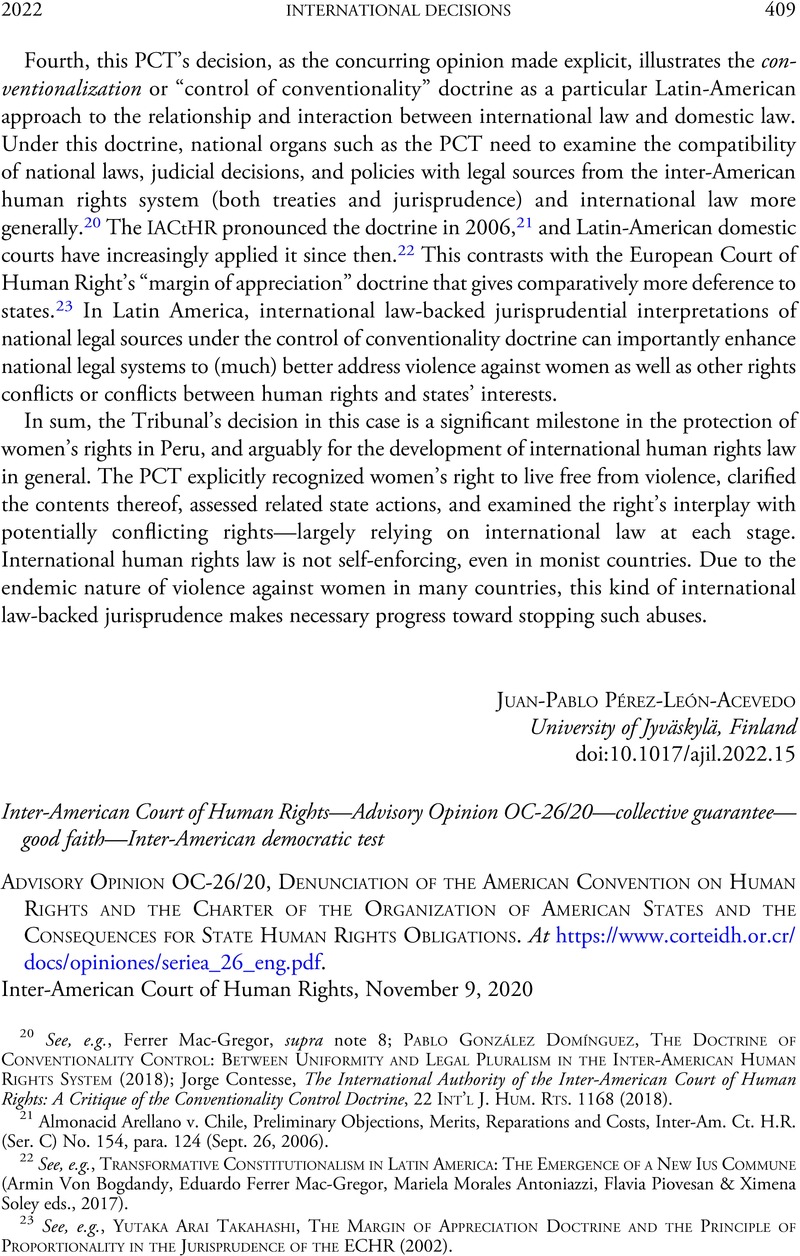Published online by Cambridge University Press: 22 April 2022

1 See, inter alia, Advisory Opinion OC-25/18, para. 199 (Inter-Am. Ct. H.R May 30, 2018); Case of González, et al. (“Cotton Field”) v. Mexico, Judgment, Preliminary Objection, Merits, Reparations and Costs, Inter-Am. Ct. H.R. (ser. C) No. 205, para. 62 (Nov. 16, 2009); Case of the Constitutional Court v. Peru, Judgment (ser. C) No. 55, para. 41 (Sept. 24, 1999); and Case of González, et al. (“Campo Algodonero”) v. Mexico, supra note 1, para. 62; Case of Ivcher-Bronstein v. Peru, Judgment, Inter-Am. Ct. H.R (ser. C) No. 54, para. 42 (Sept. 24, 1999); the latter with reference to Ireland v. UK, App. No. 5310/71 (Eur. Ct. H.R. Mar. 20, 1978), at https://hudoc.echr.coe.int/eng?i=001-57506.
2 Anne Peters, The Deconstitutionalisation of International Law in Times of Populism and Pandemic (virtual presentation given with the University of Nottingham, Mar. 19, 2021), handout available at https://www.mpil.de/files/pdf6/apeters_deconstitutionalisation-v1.pdf; Ginsburg, Tom, Authoritarian International Law?, 114, AJIL 221 (2020)Google Scholar.
3 Helfer, Laurence R., Rethinking Derogations from Human Rights Treaties, 115 AJIL 20 (2021)CrossRefGoogle Scholar; Sandholtz, Wayne, Bei, Yining & Caldwell, Kayla, Backlash and International Human Rights Courts, in Contracting Human Rights: Crisis, Accountability, and Opportunity 159 (Brysk, Alison & Stohl, Michael eds., 2018)Google Scholar.
4 Silvia Steininger, Don't Leave Me This Way: Regulating Treaty Withdrawal in the Inter-American Human Rights System, EJIL:Talk! (Mar. 5, 2021), at https://www.ejiltalk.org/dont-leave-me-this-way-regulating-treaty-withdrawal-in-the-inter-american-human-rights-system.
5 Trinidad and Tobago had earlier withdrawn from the American Convention in 1999. Beyond Latin America, various further cases of backlash and withdrawal have been noted by comparative scholars and commentators. Stiansen, Øyvind & Voeten, Erik, Backlash and Judicial Restraint: Evidence from the European Court of Human Rights, 64 Int'l Stud Q. 770 (2020)Google Scholar; Alter, Karen J., Gathii, James T. & Helfer, Laurence R., Backlash Against International Courts in West, East and Southern Africa: Causes and Consequences, 27 Eur. J. Int'l L. 293 (2016)CrossRefGoogle Scholar.
6 IACHR Press Release, The IACHR Stresses Its Competent Jurisdiction Concerning Nicaragua and Laments Nicaragua's Decision to Denounce the Charter of the OAS in a Context of Serious Human Rights Violations, Press Release 312 (Nov. 20, 2021), at https://www.oas.org/en/IACHR/jsForm/?File=/en/iachr/media_center/PReleases/2021/312.asp.
7 Berbera, Hayde Rodarte. The Pro Personae Principle and Its Application by Mexican Courts, 4 Queen Mary Hum. Rts. L. Rev. 1 (2017)Google Scholar.
8 See paragraph 106 for considerations on jus cogens norms recognized on behalf of the Court.
9 Armin von Bogdandy, The Transformative Mandate of the Inter-American System – Legality and Legitimacy of an Extraordinary Jurisgenerative Process, at 113 (2019-16 Max Planck Institute for Comparative Public Law & International Law (MPIL) Research Paper, 2019).
10 Marín, Daniela Salazar, Ordóñez, Ana Isabel Cobo, García, Camila Cruz, Ruales, Mateo Guevara & Vela, María Paula Mesías, La fuerza vinculante de las Opiniones Consultivas de la Corte Interamericana de Derechos Humanos a la luz del derecho y la justicia constitucional en Ecuador, 32 Foro Revista de Derecho 123 (2019)Google Scholar; Cavagnaro Burgos, Gabriela Anais, Jijón Vera & Sara Cristina, ¿Son vinculantes las opiniones consultivas que emite la Corte Interamericana de Derechos Humanos? (Universidad Católica de Santiago de Guayaquil, Feb. 10, 2020), available at http://repositorio.ucsg.edu.ec/handle/3317/14488; Hitters, Juan Carlos, ¿Son vinculantes los pronunciamientos de la Comisión y de la Corte Interamericana de Derechos Humanos?, 10 Revista Iberoamericana de Derecho Procesal Constitucional 149 (2008)Google Scholar.
11 See also Pedro Nikken, La función consultiva de la Corte Interamericana de Derechos Humanos, in El sistema interamericano de protección de los derechos humanos en el umbral del siglo XXI (Antônio Augusto Cançado Trindade, et al. eds., 2003).
12 For a discussion, see Grossi, Eduardo Vio. La naturaleza no vinculante de las opiniones consultivas de la Corte interamericana de derechos humanos, 2 Revista Jurídica Digital UANDES 200 (2018)Google Scholar.
13 Advisory Opinion OC-15/97 Inter-Am. Ct. H.R. (ser. A) No. 15, para. 26 (Nov. 14, 1997).
14 For Advisory Opinion OC-26/20 (Nov. 9, 2020), written observations were presented by Bolivia, Brazil, Colombia, Honduras, Mexico, Nicaragua, Panama, and the United States, as well as by the Inter-American Commission on Human Rights. Further, forty-nine amicus curiae were presented. Virtual hearings took place in June 2020; thirty interventions were delivered.
15 See paragraph 42 for specifications on the referential time frame from the moment a state expresses its intention to denounce until the state has fulfilled its obligations to disengage from the OAS.
16 Case of Ivcher-Bronstein v. Peru, supra note 1, para. 42.
17 For the concept of this democratic test, see Mariela Morales Antoniazzi, Protección supranacional de la democracia en Suramérica: Un estudio sobre el acervo del ius constitutionale commune (2015).
18 Charlesworth, Hilary, Democracy and International Law, 371 Recueil des Cours 43 (2014)Google Scholar, available at http://dx.doi.org/10.1163/1875-8096_pplrdc_A9789004289369_02.